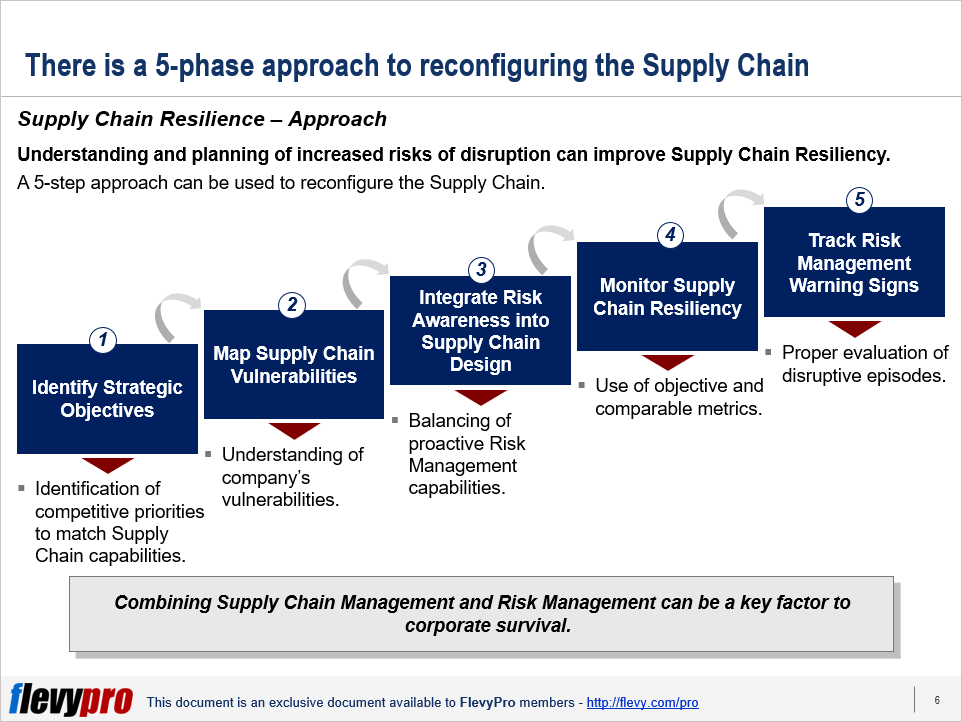Editor's Note: Take a look at our featured best practice, KPI Compilation: 600+ Supply Chain Management KPIs (141-slide PowerPoint presentation). This presentation is a comprehensive collection of Key Performance Indicators (KPI) related to Supply Chain Management (SCM). A KPI is a quantifiable measure used to evaluate the success of an organization, employee, or process in meeting objectives for performance.
KPIs are typically [read more]
Also, if you are interested in becoming an expert on Supply Chain Management (SCM), take a look at Flevy's Supply Chain Management (SCM) Frameworks offering here. This is a curated collection of best practice frameworks based on the thought leadership of leading consulting firms, academics, and recognized subject matter experts. By learning and applying these concepts, you can you stay ahead of the curve. Full details here.
* * * *
Supply Chain Resiliency is the capability of the Supply Chain to be prepared for unexpected risk events. It is the Supply Chain’s ability  to respond and recover quickly to potential disruptions. It can return to its original situation or grow by moving to a new, more desirable state in order to increase customer service, market share, and financial performance.
to respond and recover quickly to potential disruptions. It can return to its original situation or grow by moving to a new, more desirable state in order to increase customer service, market share, and financial performance.
Resilience is currently an increasing concern in the Supply Chain caused by globalization. The Supply Chain is globally being subject to diverse types of disturbances. The largest disruption so far in the global Supply Chain in modern history was the earthquake and tsunami in Japan in March 2011. With the rising level of logistical complexity, the resiliency of the Supply Chain has not kept pace. These disturbances need to be handled in the right way, compelling the use of tools and approaches that can support resilient Supply Chain decisions.
With the onset of the COVID-19 pandemic, resiliency in the Supply Chain is further emphasized.
Understanding Supply Chain Resilience
The risk of Supply Chain disruption is increasing. A recent study by Aon Risk Solutions showed that the percentage of global companies reporting a loss of income due to a Supply Chain disruption increased from 28% in 2011 to 42% in 2013. The MIT Scale Network Study further showed that many large companies are unable to create contingency rules and procedures for operations during a complex, high-risk event.
According to the MIT study, approximately 60% of surveyed managers either do not actively work on Supply Chain risk management or do not consider their company’s risk management practice effective. Managers have been found to be lacking in a framework that will guide them in the deployment of risk management practices. In fact, it has been noted that there is little understanding of risks resulting in a lack of knowledge of what kind of framework fits a particular Supply Chain dynamics.
For Supply Chain Management to keep up with the increasing level of logistical complexity, there is a need to reconfigure the Supply Chain.
The 5-phase Approach to Supply Chain Resilience
In 2005, Cisco had difficulty coping when Hurricane Katrina struck. The Supply Chain performance level was not maintained to cope with the sudden surge in orders for new equipment to replace damaged telecommunication infrastructure. The Cisco teams cannot locate all products in the Supply Chain or understand the financial impact of emergency sales. However, in 2011, that was a turning point for Cisco. Cisco had deployed a very solid Supply Chain resiliency program that addressed the impact of external vulnerabilities and the aftereffects it caused to the Supply Chain.
Cisco has succeeded by executing a 5-phase approach to Supply Chain Resiliency.

In reconfiguring its Supply Chain to make it more resilient, Cisco first identified its strategic objectives.
Phase 1: Identify Strategic Objectives. The first phase is focused on identifying competitive priorities for particular product categories. It matches priorities with Supply Chain capabilities.
Through Strategic Planning, Cisco was able to build its competitive advantage which depended on its ability to match global opportunities to outsource production with global market opportunities. This is known as the Cisco Lean Model.
Phase 2: Mapping Supply Chain Vulnerabilities. This focused on understanding the company’s vulnerabilities. Supply Chains are vulnerable on many fronts—political upheavals, regulatory compliance mandates, increasing economic uncertainty, natural disasters, etc. Being aware of the vulnerabilities will enable the organization to come up with the appropriate design to achieve Supply Chain Resiliency.
In undertaking the second phase, Cisco focused on supporting a responsible global Supply Chain characterized by product differentiation, high value, and high margins. Mitigation measures were also implemented to make a resilient Supply Chain.
With the 5-phase approach, Cisco was able to achieve a resilient Supply Chain capable of effectively managing disruptions. It has also prepared them in addressing risk management warning signs and deploying the appropriate reactive tools to every kind of significantly disruptive event.
Interested in gaining more understanding of Supply Chain Resiliency? You can learn more and download an editable PowerPoint about Supply Chain Resiliency here on the Flevy documents marketplace.
Do You Find Value in This Framework?
You can download in-depth presentations on this and hundreds of similar business frameworks from the FlevyPro Library. FlevyPro is trusted and utilized by 1000s of management consultants and corporate executives. Here’s what some have to say:
“My FlevyPro subscription provides me with the most popular frameworks and decks in demand in today’s market. They not only augment my existing consulting and coaching offerings and delivery, but also keep me abreast of the latest trends, inspire new products and service offerings for my practice, and educate me in a fraction of the time and money of other solutions. I strongly recommend FlevyPro to any consultant serious about success.”
– Bill Branson, Founder at Strategic Business Architects
“As a niche strategic consulting firm, Flevy and FlevyPro frameworks and documents are an on-going reference to help us structure our findings and recommendations to our clients as well as improve their clarity, strength, and visual power. For us, it is an invaluable resource to increase our impact and value.”
– David Coloma, Consulting Area Manager at Cynertia Consulting
“As a small business owner, the resource material available from FlevyPro has proven to be invaluable. The ability to search for material on demand based our project events and client requirements was great for me and proved very beneficial to my clients. Importantly, being able to easily edit and tailor the material for specific purposes helped us to make presentations, knowledge sharing, and toolkit development, which formed part of the overall program collateral. While FlevyPro contains resource material that any consultancy, project or delivery firm must have, it is an essential part of a small firm or independent consultant’s toolbox.”
– Michael Duff, Managing Director at Change Strategy (UK)
“FlevyPro has been a brilliant resource for me, as an independent growth consultant, to access a vast knowledge bank of presentations to support my work with clients. In terms of RoI, the value I received from the very first presentation I downloaded paid for my subscription many times over! The quality of the decks available allows me to punch way above my weight – it’s like having the resources of a Big 4 consultancy at your fingertips at a microscopic fraction of the overhead.”
– Roderick Cameron, Founding Partner at SGFE Ltd
“Several times a month, I browse FlevyPro for presentations relevant to the job challenge I have (I am a consultant). When the subject requires it, I explore further and buy from the Flevy Marketplace. On all occasions, I read them, analyze them. I take the most relevant and applicable ideas for my work; and, of course, all this translates to my and my clients’ benefits.”
– Omar Hernán Montes Parra, CEO at Quantum SFE

23-slide PowerPoint presentation
Supply Chain "resilience" is the Supply Chain's ability to respond and recover quickly to potential disruptions. It can return to its original situation or grow by moving to a new, more desirable state in order to increase customer service, market share, and financial performance.
Resilience is
[read more]
Want to Achieve Excellence in Supply Chain Management (SCM)?
Gain the knowledge and develop the expertise to become an expert in Supply Chain Management (SCM). Our frameworks are based on the thought leadership of leading consulting firms, academics, and recognized subject matter experts. Click here for full details.
Supply Chain Management (SCM) is the design, planning, execution, control, and monitoring of Supply Chain activities. It also captures the management of the flow of goods and services.
In February of 2020, COVID-19 disrupted—and in many cases halted—global Supply Chains, revealing just how fragile they have become. By April, many countries experienced declines of over 40% in domestic and international trade.
COVID-19 has likewise changed how Supply Chain Executives approach and think about SCM. In the pre-COVID-19 era of globalization, the objective was to be Lean and Cost-effective. In the post-COVID-19 world, companies must now focus on making their Supply Chains Resilient, Agile, and Smart. Additional trends include Digitization, Sustainability, and Manufacturing Reshoring.
Learn about our Supply Chain Management (SCM) Best Practice Frameworks here.
Readers of This Article Are Interested in These Resources

25-slide PowerPoint presentation
In today's Digital Age, organizations are faced with the changing nature of the demand curve and the element of uncertainty in the Supply Chain. For Operations Teams, the challenge and Competitive Advantage has become: How well we respond and execute against ongoing uncertainty.
With the world
[read more]

33-slide PowerPoint presentation
This presentation has 32 slides in all and covers the following topics:
Why PFEP - Benefits
Develop an Implementation Plan
Create a future state VSM
Plan For Every Part - Implementation
Step 1: Create PFEP Database - Current State (Part, Container, Shipping, Supplier, Consumption, Part
[read more]

19-slide PowerPoint presentation
Objective of the Presentation:
To understand and explore opportunities in supply chain optimization solutions in manufacturing by analysing overall demand trends, identifying potential end-user use cases, company profiling, and benchmarking major players in the market
Sections included:
[read more]

125-slide PowerPoint presentation
Curated by McKinsey-trained Executives
Unlock Your Supply Chain Security Potential with the Ultimate ISO 28000:2022 Awareness Training Toolkit
Are you seeking to fortify your supply chain security and gain a competitive edge in today's complex business landscape? Look no further! Introducing
[read more]
 to respond and recover quickly to potential disruptions. It can return to its original situation or grow by moving to a new, more desirable state in order to increase customer service, market share, and financial performance.
to respond and recover quickly to potential disruptions. It can return to its original situation or grow by moving to a new, more desirable state in order to increase customer service, market share, and financial performance.




